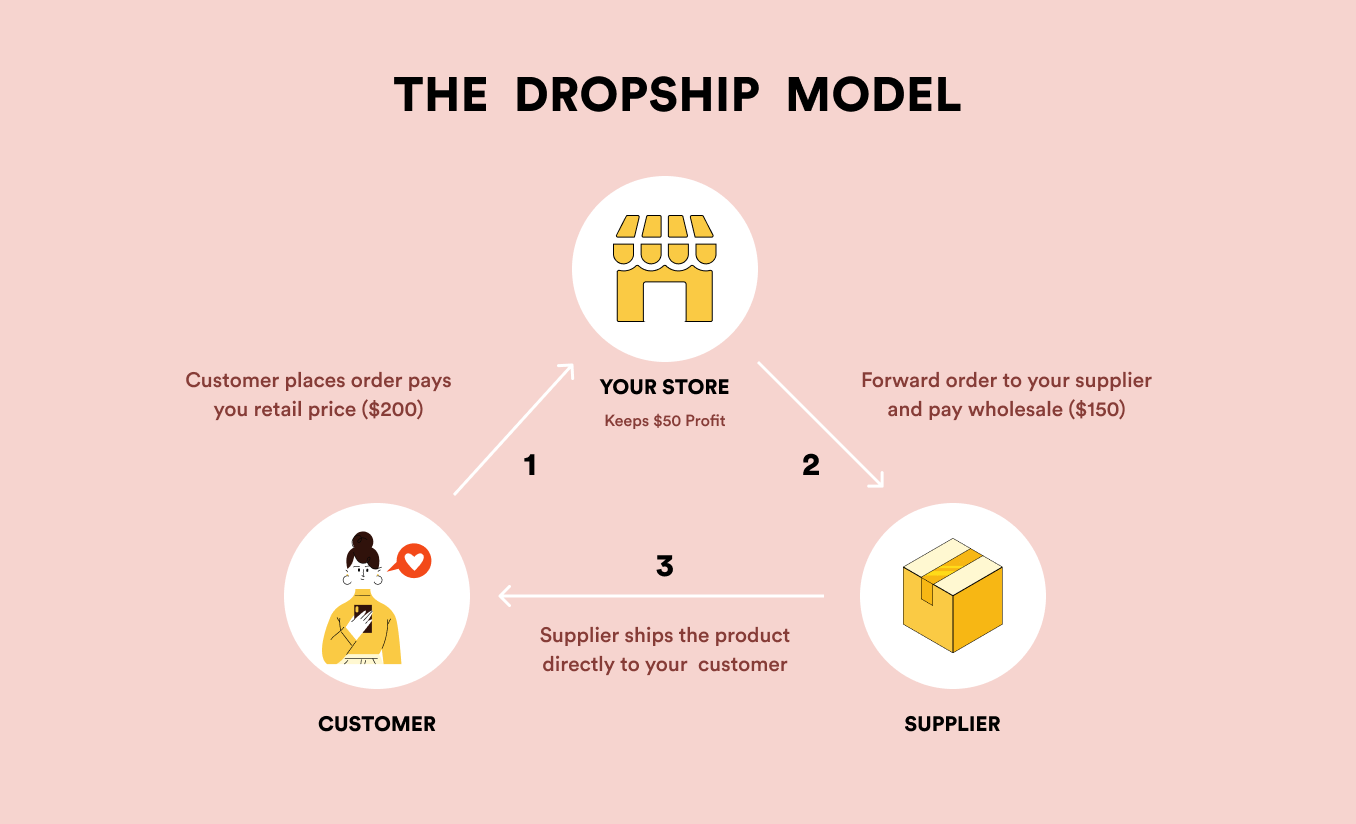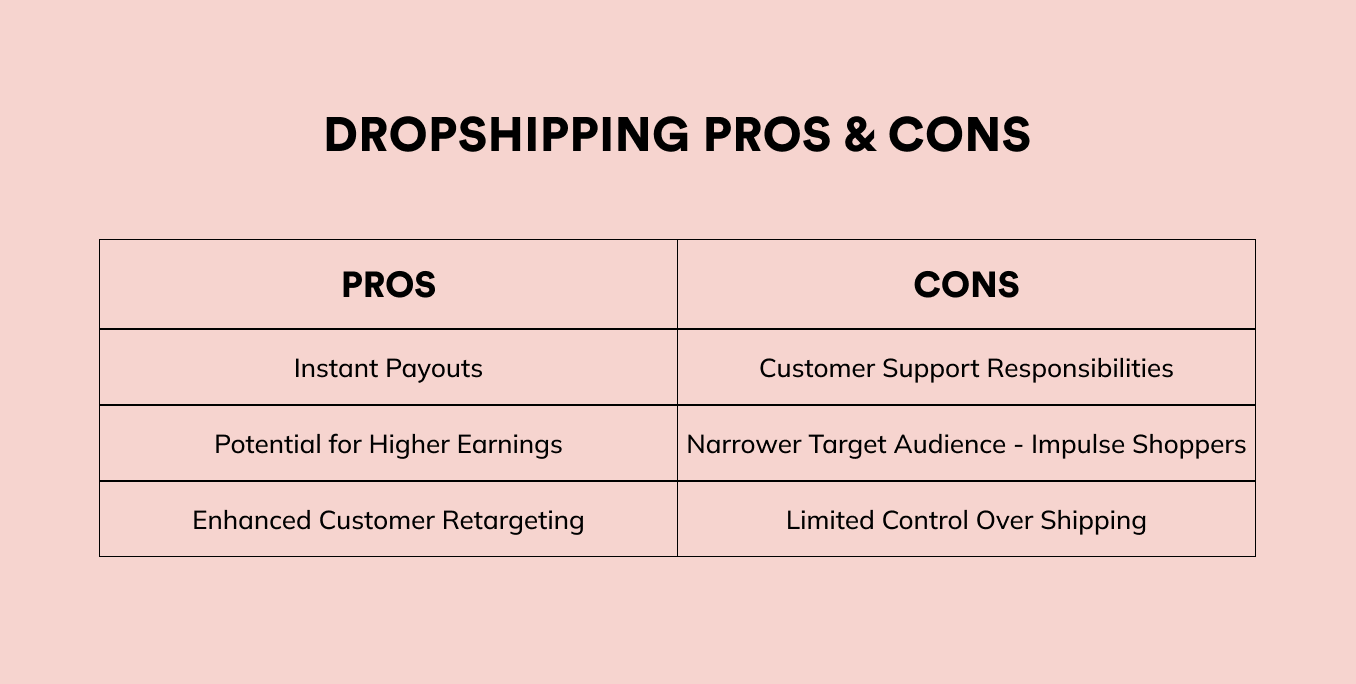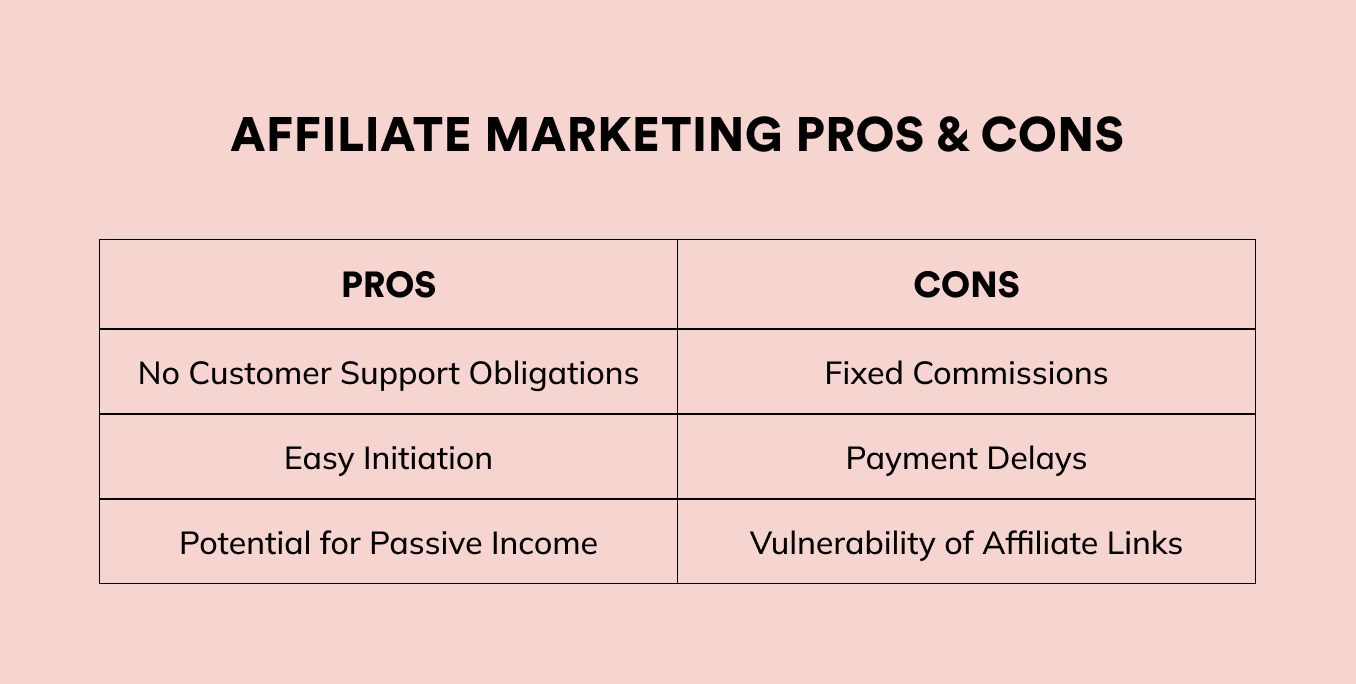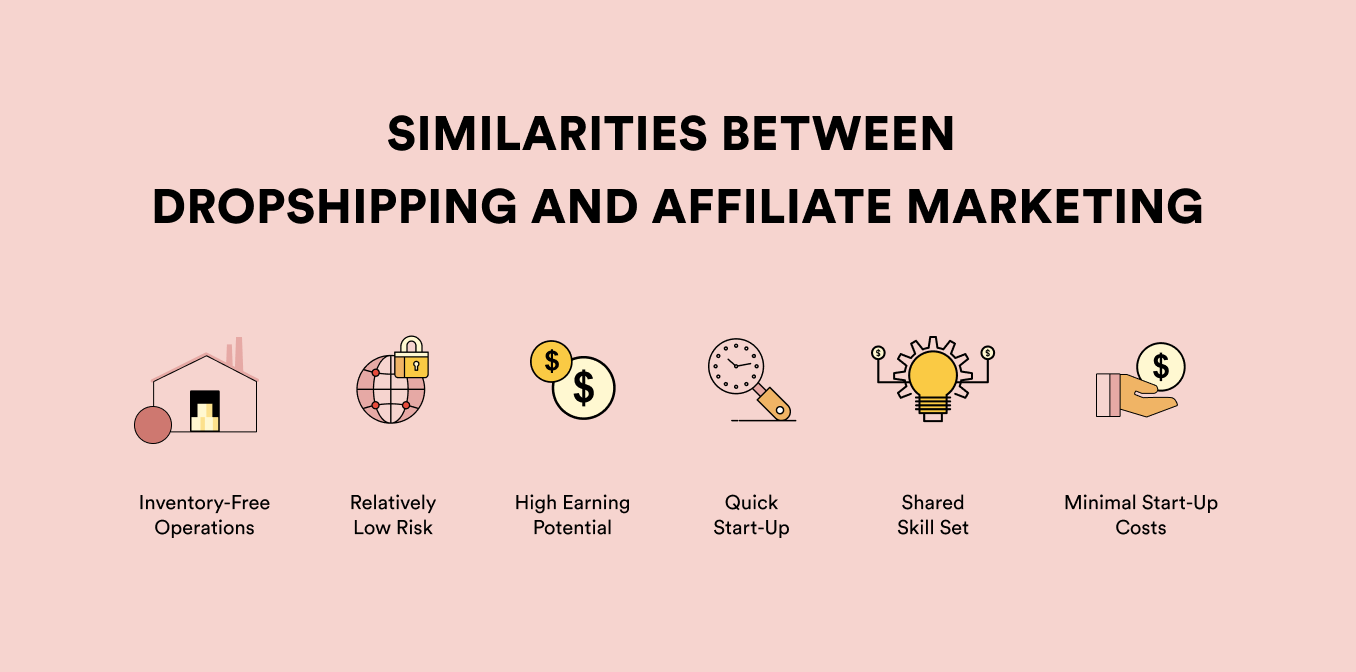Dropshipping vs. Affiliate Marketing - Pros, Cons, and Potential Profits
Explore the pros and cons of affiliate marketing vs. dropshipping. Discover which online business model suits your goals. Make informed choices for success.

In the realm of online money-making, affiliate marketing, dropshipping, and multi-level marketing frequently steal the spotlight. However, these methods are often mistaken for one another.
While we've already delved into a thorough comparison between affiliate marketing and multi-level marketing in a previous article, our focus here is a detailed head-to-head between affiliate marketing and dropshipping.
Before we dive in, it's crucial to dispel the myth that either of these paths leads to effortless wealth. Both demand diligent effort and unwavering commitment to forge a sustainable income stream. Even as you begin to witness promising earnings, maintaining profitability requires ongoing dedication.
So, let's embark on a journey to dissect their disparities, assess their advantages and disadvantages, and ultimately determine which route prevails in this guide on dropshipping versus affiliate marketing.
Dropshipping vs. Affiliate Marketing: The Basics
To put it succinctly, affiliate marketing involves promoting the products or services of other businesses to aid them in boosting their revenue, while a dropshipping venture allows you to market another company's products under your own brand identity.
A key divergence between affiliate marketing and dropshipping is their payment structure: affiliate marketers earn commissions based on sales, whereas dropshippers earn revenue directly from customers.
Nonetheless, both models share several commonalities:
- Minimal initial investment
- Elimination of inventory management and shipping responsibilities
- Relatively low-risk business approaches
Now, let’s go over each definition in more detail.
What is Affiliate Marketing?
Affiliate marketing is a business model that enables you to earn online income by endorsing products or services to your audience.
You receive a unique affiliate link that redirects potential buyers to the merchant's website, allowing them to make purchases.
Through conversion tracking, the affiliate website can attribute sales to the respective affiliates.
Consequently, when a transaction occurs through your affiliate link, you receive a portion of the sale as your commission.
Most affiliate programs offer fixed commissions, although some may compensate for free trial sign-ups, leads, website clicks, or app downloads.
Many companies, such as Apple, Fiverr, and Sephora, use an affiliate marketing program to grow their business.
What is Dropshipping?

Dropshipping constitutes an eCommerce business model that empowers you to market products from various suppliers through your own website. Initiating a dropshipping enterprise doesn't necessitate inventory management or shipping to customers.
Additionally, it affords you the autonomy to set your product prices, typically based on the difference between your selling price and the wholesale cost. Nevertheless, you bear the responsibility of devising marketing campaigns and addressing customer inquiries.
Upon receiving an order from a customer, you are obligated to relay it to the supplier, who subsequently fulfills the customer's order on behalf of your eCommerce store.
With a sturdy business foundation and a well-crafted strategy, success in the eCommerce realm is attainable through the dropshipping model.
Ease of Start -Affiliate Marketing vs. Dropshipping
Now that you're acquainted with these online money-making strategies, you might be pondering which one offers the easiest entry point, especially if you're new to the game.
While both ventures are relatively approachable for beginners, initiating an affiliate marketing endeavor proves simpler than launching a dropshipping store. The reason behind this lies in the absence of the need to construct a retail website and provide customer support, allowing you to channel your efforts primarily into marketing.
In fact, starting an affiliate business can be cost-free, especially if you already operate a blog or boast a substantial following on your social media profiles. Moreover, locating suitable affiliate programs is a breeze through affiliate networks that present a diverse array of merchant options.
For the most straightforward initiation into your affiliate marketing journey, consider creating an account on Shopper.com.
Kickstart Your Affiliate Marketing Journey With Shopper.com
Shopper.com stands as an innovative online hub designed explicitly for content creators, publishers, and marketers aiming to efficiently oversee and monetize their affiliate product promotions on a large scale. With an extensive roster of over 25,000 affiliate partnerships spanning various brands, this platform equips creators not only to enrich their content but also to maximize their earnings.
Getting Started With Shopper.com
Registering on Shopper.com is both uncomplicated and entirely cost-free. The signup process is straightforward: visit https://www.shopper.com/ and enter a unique username in the designated text bar on the homepage.
Please note that your chosen username must be unclaimed and not utilized by any other creator. If you input a username that's already in use, you'll receive a notification below the search bar stating, "Username is not available, choose another one." Otherwise, it will indicate, "Username is available."
Once you've secured a distinctive username, click on "Claim your page," and you're ready to add products from your preferred niche, commencing your journey of earning through product recommendations.
For those looking to harness the full potential of the platform, we recommend perusing our guide on how to get started on your journey with Shopper.com as a content creator.
Before entering any program, it's essential to define your niche and identify products that align with your audience. This step helps you steer clear of common affiliate marketing pitfalls.
Additionally, remember to optimize your content by employing appropriate keywords and adhering to sound SEO practices. Doing so will enhance the visibility of your content on search engines, driving more traffic to your site.
Conversely, the dropshipping business model demands more effort, involving various tasks such as market research, supplier scouting, pricing strategy formulation, and customer service management. Effective communication with suppliers becomes paramount to address issues like incorrect orders, product returns, and delivery mishaps.
Bear in mind that your choice of reliable dropshipping suppliers is critical, as your business relies on their products. Opting for the wrong suppliers can have detrimental effects on your enterprise, so consider factors like their reputation, product quality, and service reliability wisely.
Dropshipping vs. Affiliate Marketing - Pros & Cons
Although we've covered the fundamental concepts of both online business models, delving into the respective pros and cons of affiliate marketing and dropshipping will provide a more comprehensive perspective.
As we've established that affiliate marketing offers a more straightforward entry point, an exploration of its pros and cons will help you gain a clearer insight into which approach aligns best with your goals.
Dropshipping Pros & Cons

Dropshipping Pros
- Instant Payouts: In the dropshipping model, you don't need to accumulate a specific sales threshold to receive payment. This sets it apart from affiliate marketing, where your earnings may be withheld until a sales quota is met. With dropshipping, you can cash out your earnings right after a customer pays the retail price.
- Potential for Higher Earnings: In dropshipping, you have the flexibility to adjust product prices, potentially leading to higher earnings per item. This option is absent in affiliate marketing, where you earn a fixed percentage of the sale. By strategically pricing your products, you can increase your profit margins.
- Enhanced Customer Retargeting: Managing an online store on your own website allows you to implement retargeting strategies to re-engage potential customers until they complete a purchase. This feature is unavailable in affiliate marketing since you direct traffic to third-party websites.
Dropshipping Cons
- Customer Support Responsibilities: Dropshipping websites resemble eCommerce stores, which can lead customers to believe they're buying directly from you. As a dropshipper, you'll need to provide customer support, adding extra responsibilities.
Fortunately, various options, such as outsourcing customer communication to freelancers, Upwork, or specialized agencies, are available to streamline and lighten your workload.
- Narrower Target Audience: Impulse Shoppers: Dropshipping often relies on impulse buying, which may not resonate with all consumers. Many individuals prefer to compare products for the best deals, potentially bypassing your offerings.
This dynamic necessitates creative strategies to persuade customers to make immediate purchases. Additionally, your success in dropshipping hinges heavily on your chosen niche; oversaturated niches can constrain your pricing flexibility.
- Limited Control Over Shipping: Shipping-related complaints are not uncommon in dropshipping. Delays can occur due to suppliers' preferences, leading to customers experiencing delays in receiving their orders.
As a dropshipper, you may receive negative feedback and risk losing customers, even if the shipping issues are beyond your control. This aspect of dropshipping can be particularly frustrating.
Affiliate Marketing Pros & Cons

Affiliate Marketing Pros:
- No Customer Support Obligations: In affiliate marketing, you are relieved of customer service responsibilities. Customers do not purchase from you directly, but rather through a merchant. Consequently, there's no expectation for you to provide customer support. Once customers make a purchase through your affiliate link, your role is essentially complete. This frees up your time and effort to focus on more effective promotion strategies.
- Easy Initiation: Similar to dropshipping, affiliate marketing eliminates concerns about order fulfillment, stock management, and delivery issues. You simply join affiliate programs like Clickbank, Amazon Associates, or ShareASale, choose offers, and start promoting them. Your primary expenses typically revolve around marketing costs, such as website or domain expenditures and traffic generation.
- Potential for Passive Income: While affiliate marketing isn't entirely passive, it has the potential to become passive over time. After investing in brand promotion and optimizing your marketing strategy, much of the work is done. You can then run paid ads in the background, capitalizing on brand recognition to drive sales.
Affiliate Marketing Cons:
- Fixed Commissions: Unlike dropshipping, where you have control over pricing and can potentially earn more, affiliate marketing typically provides fixed commissions based on the leads you generate. Sometimes, your spending on customer acquisition may exceed the commission earned, leading to profitability challenges.
- Payment Delays: Affiliate commissions are often paid on a monthly basis or upon reaching specific performance milestones. Unfortunately, delayed payments can occur due to various reasons, impacting your cash flow. In contrast, dropshipping offers more immediate compensation upon customer payment.
- Vulnerability of Affiliate Links: Customers unfamiliar with affiliate marketing may view affiliates as trying to take extra money from them. When customers detect an affiliate link, they may become suspicious, potentially bypassing it or removing the tracking code. This can result in lost affiliate commissions and render your efforts ineffective. Using link shorteners can help disguise affiliate links, but this issue remains a challenge in affiliate marketing.
Similarities Between Dropshipping and Affiliate Marketing

Although dropshipping and affiliate marketing differ in various aspects, they also share several noteworthy similarities:
- Inventory-Free Operations: Both models allow you to initiate a business without the need for inventory management or product shipping.
- Relatively Low Risk: They both present relatively low-risk business models, making them accessible to entrepreneurs with varying levels of experience.
- High Earning Potential: Both avenues offer substantial earning potential, depending on your dedication and strategy.
- Quick Start-Up: You can swiftly commence work in both fields without extensive lead time.
- Shared Skill Set: Dropshipping and affiliate marketing require similar skill sets, including ad creation, traffic generation, and other essential marketing proficiencies.
- Minimal Start-Up Costs: Both business types boast low initial investment requirements, further enhancing accessibility.
Which is More Profitable?
Both dropshipping and affiliate marketing can yield impressive profits. Consider integrating these two approaches to maximize your business potential. One effective strategy is to incorporate a store within your affiliate website.
By doing so, you expand your offerings to include both your own products and affiliate products, providing more choices to your audience and enabling you to earn commissions and sales revenue simultaneously.
Alternatively, you can embark on a private-label dropshipping venture, wherein you market products under your own brand. This path proves advantageous for those seeking to foster customer loyalty and establish a stream of recurring revenue within their business.
Over to You!
In the dynamic realm of online business, the choice between dropshipping and affiliate marketing is not a matter of one-size-fits-all. Instead, it's about recognizing the nuances, understanding your strengths and goals, and aligning them with the most suitable approach.
Our exploration of these two strategies has unveiled their unique characteristics and opportunities. In one corner, dropshipping, with its immediate payouts, potential for higher earnings per item, and greater control over the customer journey, presents an enticing option for those willing to take on customer support responsibilities and navigate the intricacies of product pricing.
On the other side, affiliate marketing shines with its simplicity, requiring no inventory management or shipping obligations. It's an excellent starting point for those looking to bypass the complexities of eCommerce and focus on promotion and content creation.
As we've dissected their pros and cons, you've gained a deeper understanding of what each path entails. The decision ultimately hinges on your individual strengths, preferences, and long-term vision.
But why limit yourself to just one approach? A hybrid strategy can provide the best of both worlds. By integrating a store into your affiliate website or venturing into private-label dropshipping, you can diversify your offerings, cater to a broader audience, and harness multiple revenue streams.
In the end, the profitability of dropshipping vs. affiliate marketing isn't an either-or proposition. It's about recognizing the potential for synergy between these models and crafting a strategy that aligns with your aspirations. Whether you opt for dropshipping, affiliate marketing, or a fusion of both, success in the online business arena awaits those who approach it with diligence, adaptability, and a commitment to delivering value to their audience.
So, as you embark on your online entrepreneurial journey, make an informed choice, stay persistent, and seize the boundless opportunities that the digital landscape offers.



